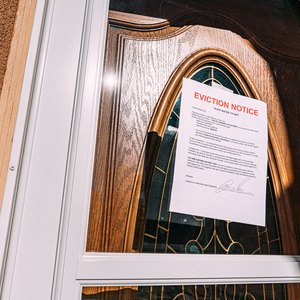
When a landlord decides that it is time for a tenant to move out, they are almost always legally obligated to inform the tenant in writing of their decision. If a tenant has a lease, the property owner can issue a notice to terminate tenancy or termination of tenancy letter. As long as the tenant cooperates, there is no need for further action.
However, the tenant may refuse to leave despite providing the landlord with reasonable grounds to kick them out. In that case, that property owner must follow take legal steps to have the tenant evicted from the rental home.
Therefore, it is important to understand lease termination versus eviction, and what each implies for both the tenant and property owner.
Read More: Foreclosure & Eviction
Termination of Tenancy Meaning
When a landlord or tenant decides to terminate (or not renew) a lease or rental agreement, state law often requires one party to give written notice of his decision to the other party. This is sometimes known as a “notice to terminate” or “notice to quit.” A property owner can create the letter using any state-specific notice to quit template available online.
Basics of Evictions
An eviction is a legal proceeding in which a landlord asks a court to order the tenant to leave the property. Giving a tenant a notice to terminate is often a first step in the eviction process, but it isn't the same as an eviction, which comes afterwards if a tenant defies a notice to quit.
If your lease expires or you fail to pay rent, you can be evicted easily. Also, if you commit non-trivial violations against your lease agreement, the odds of getting evicted will rise significantly.
Types of Notices
The types of termination notices required to begin the eviction process differ between states. In many states, landlords can use several different types of “quit notices” depending on the circumstances.
- A “quit-or-pay” notice notifies a tenant that the rent is past due and of the landlord's intention to evict if it isn't paid.
- A “cure-or-pay” notice orders the tenant to correct a problem (such as loud noises) before facing eviction.
- An “unconditional quit” notice orders the tenant off the property, with no second chances to pay a bill or change behavior.
Some states only allow landlords to issue unconditional quit notices in cases where a tenant is using the home for criminal activity or repeatedly doesn't pay rent or follow property rules. Once a landlord files for eviction, they will have to serve the tenant with a summons to appear in court. This is an official notice from the court that an eviction hearing is to take place.
Time Frame Before Eviction
In some states, a tenant may have five or 10 days to pay the rent or get rid of a barking dog. If the situation is very serious, such as a tenant dealing drugs out of an apartment or discharging a weapon, the landlord may order the tenant to leave the premises immediately.
Methods of Service
Landlords can serve quit notices to tenants by tacking or taping them to the tenant's front door or actually handing the notice to the tenant. Some states require the landlord to mail the notice to terminate notice to the tenant via regular or certified mail.
State laws are more particular about the service of an eviction notice. In many places, only a sheriff's deputy or special process server can serve a tenant with eviction court papers.
Warning Before Evicting
Many an eviction case gets thrown out of court because a landlord failed to send the proper quit notices to his tenant. Landlords should talk to a lawyer about proper methods of service and get boilerplate termination notices for use in their landlord business.
Read More: How to Remove an Eviction Record
References
- FindLaw: Terminating a Lease or Rental Agreement: FAQs
- Nolo: State Rules on Notice Required to Change or Terminate a Month-to-Month Tenancy
- Cornell.Edu: notice to quit
- Cornell.Edu: Eviction
- Nolo: How Evictions Work: Rules for Landlords and Property Managers
- Nolo: State Laws on Unconditional Quit Terminations
- LegalZoom: Serving Your Tenant a Notice to Pay Rent or Quit
Writer Bio
Lainie Petersen writes about business, real estate and personal finance, drawing on 25 years experience in publishing and education. Petersen's work appears in Money Crashers, Selling to the Masses, and in Walmart News Now, a blog for Walmart suppliers. She holds a master's degree in library science from Dominican University.

